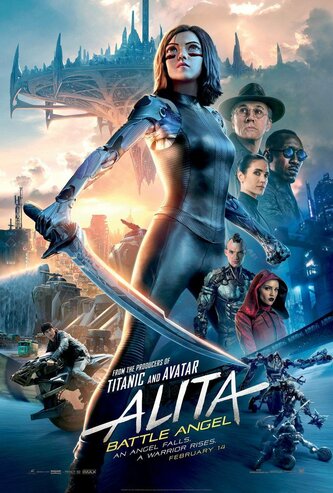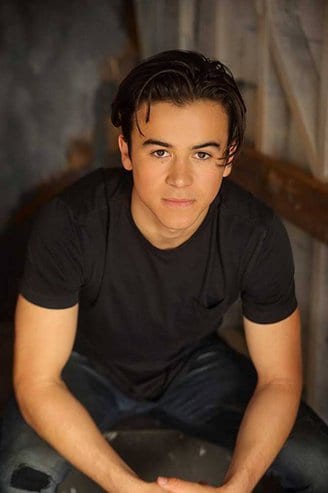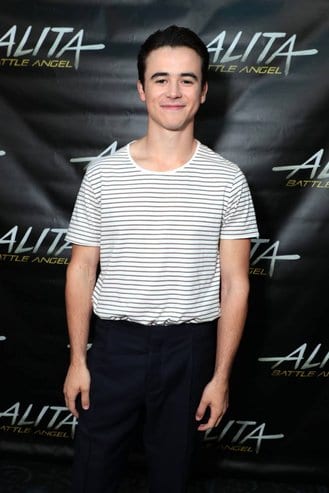Alita: Battle Angel represents a landmark collaboration between two of the best filmmakers working today. Originated (and produced) by James Cameron, the movie has Robert Rodriguez writing and directing a story that adapts Yukito Kishiro’s beloved Manga. In a devastated future world, society is split between the haves, who exist on the shining city of Zalem, floating above the Earth’s surface, and the have-nots, who must eke out a hardscrabble living in the Iron City, a place where Zalem dumps its garbage. It’s here that cyborg scientist Dr. Dyson Ido (Christoph Waltz) discovers the frame of a mechanoid young woman. As Alita (Rosa Salazar) figures out who she really is and what she’s meant for, the world will never be the same again.
Keean Johnson plays Hugo, the young man who becomes an important part of Alita’s life.
Struggling with his own quest to better his life, Hugo has the street smarts to help her cope with a confusing world but might not be as prepared as he thinks for everything that surrounds Alita. Johnson makes his film debut Battle Angel, and here talks working with Robert Rodriguez after being a fan of his previous movies, the staggering scale of the sets and getting to do some of his own stunts.
https://twitter.com/DUALIPA/status/1088454161069334528
How did you first get involved in Alita? Was it just a standard audition? Was it something that you found out about?
I first heard about this from my agent in December of 2015 and I just got called to go in. I was such a huge fan of both James Cameron and Robert Rodriquez. I thought, ‘wow, this is pretty big time. I would love to just have the opportunity to audition for it!’ I went in, read for the role. And I didn’t hear anything for three or four months until I got a call from my manager. They said, “Robert really likes your tape.” And they told me he’d like to meet me. I met with Robert the first time, and I was so incredibly nervous. He seemed to think that I did a good job despite that. Then I came in for a second meeting with Robert and this time I thought, ‘okay, I met the guy. Now I can really show him without being nervous at all.’ And the second audition went really great. A month later I was told I’d go to Austin, and going to test for the role with Rosa, me amongst four or five other guys. So, I auditioned. I put my best foot forward. Rosa and I hit it off right away, and I think Robert and I just clicked and it worked out: I was in Alita!
How did you react then when you actually got the part?
I had to wait for 36 days, I think. The most agonizing email refreshing, every hour on the hour. I got an email from Robert and the subject said, “Guess What?” and then in the body was a photo of Yukito Kishiro’s Alita and it was the moment where Hugo is kissed by Alita. And it was just a photo, that was it. I sent it to my team and they said, “Well we actually haven’t heard yet, we’re sure this is a yes, but we’re going to call right now.” Finally, I got the call and it was definitely a very intense milestone moment. I just started packing my bags and was on a flight within five or six days, ready to work for five months.
In your own words, who is Hugo and sort of how does he fit into the story?
Hugo’s a kid who’s just been torn apart by Iron City for years and he’s learned how to adapt, how to actually thrive there. But all he wants to do is get out and when he meets Alita, he sees a moment where this place becomes interesting for once. I think that she metaphorically helps him to learn who he is or who he wants to be. He’s someone who’s learned from a very young age that no one’s going to hand him anything and he’s gotta get everything himself. And he sometimes he has to do things that he’s not particularly proud of, but it’s all for what he thinks is the greater good.
What was it about him that appealed to you? And did you look for something you could add to him?
I think what was so important for Hugo and what I saw right when I first read it, he obviously comes across as this tough, street smart, doesn’t-need-anyone type of guy. But searching deep down into him it was figuring out this guy has such vulnerability. And what I wanted to bring to him was just to add that vulnerable side to him that he tries to hide. I think he hasn’t been able to show it to anyone in his life until he finally meets Alita, someone who loves him just the way he is. He doesn’t have to put on a face or put up a front.
Did you read the manga? Have you read it since?
I didn’t even know anything about the film for the first audition I didn’t know what source material to look at, I had no idea what Alita was. Right, when I got the role, I watched the anime on YouTube, I believe. I also got a few of the books because I really wanted to see what the world looked like. Robert’s the best at honoring source material, and when you’re able to open the book, then look at the screen and see the exact same shot, it’s pretty exciting. There’s some pretty cool stuff paying homage to Yukito but also you have that James Cameron-Robert Rodriguez feel.
I especially love the set design of Iron City. Robert really wanted to make it as multicultural as possible, and there are just the tiniest little details that probably no one would ever see from different cultures around the world. You have Hispanic and there’s some French, Italian, Middle Eastern even in the set decorating and the graffiti on the walls. I barely had to act when I was on that set because we were totally immersed in that space.
Did you have to adapt to working with so many visual effects?
I think what was so cool is we had such an amazing team of visual effects artists who would come in and they’d say, “okay, we’re about to shoot this scene.” They’d go through their sketches and say, “this is kind of what it will look like.” Just having that visual ahead of time to be able to know how high these things are and how they’ll swoop up to the right or to the left. And they were so detailed that we really were able to get the visual and then we’d be able to keep it in our head while we were shooting. It was really cool to see how both Weta and the practical teams would work together to seamlessly make Alita into what it is or what it will be.
I think it’s just safe to say I’ve never done anything like what Weta has to offer. It truly felt like you were at NASA with the amount of technology that was running around at all times. I just I wanted to learn as much as possible and became pals with a few of the Weta employees.
You said that you and Rosa found fairly easy chemistry. How was it working with her and was that bond the two characters share fairly easy to find?
The very first time I met her when we were testing, I was so nervous. And I think that the second I met her, she just came out with open arms and we immediately became friends from the first take that we did. Then when I got the part, we thought it was really important to spend time offset with each other as well, to get to know each other. And we really bonded. Aside from both being actors, we’re both huge film fans and film critics as well. So, we would just talk about the film and talk about what our hopes were for the movie and for the future, and we aligned on a lot of things.
Did you have to get used to her motion capture gear?
It was definitely interesting to get used to the facial camera because it protruded a foot from her face. So, doing any sort of kissing scenes or anything like that, you always had to be aware of this huge, metal fist coming right at your face!
It’s one thing to be a fan of somebody and then to actually work with them. So how was Robert as a director?
When I was a kid we used to drive a lot, do a lot of cross-country road trips, and we had a little DVD player. We played the Spy Kids movies on repeat until the discs broke. I was just such a huge fan of Robert when I was younger, and then even as I aged up, I got to find other movies like Sin City and Desperado, or From Dusk ‘Till Dawn. All these brilliant movies. Robert was always just so down to answer any of my questions of how he would shoot something or how he would start the creative process of making these films. He was just such a fun guy to talk to and he was excited to still talk about his earliest work. And I was used to working in TV, where directors will come to you and they’ll say, “all right, let’s change this.” And then in the next take, they’ll say, “let’s change that.” And there’s such a fast pace of work that you’re just trying to keep up. On the film, Robert wasn’t coming up to me for the first few takes. I’m thinking, ‘what is going on? Am I doing terribly?’ But then he would come up to me on one or two occasions in the day. And he would say a note that was so profound and so special that it would change not only the scene but my whole character. So, I think that’s why so many people like to work with Robert because he lets you do your thing and he watches from afar and he’ll only say something when it truly is needed to be said. And it’s the best note you’ve ever gotten as an actor. Robert was extraordinary.
Did you have any contact with James Cameron at all?
He was on set for one of our big fight scenes and just like Robert’s films, I used to watch Abyss: The Director’s Cut all the time when I was younger. So, when I first met him, we spent, I think, 30, 40 minutes just talking about The Abyss and talking about how he went about obviously making some of the most iconic films of all time. And he came across as just such a relaxed, easygoing guy that loved movies. Spending time with him, I feel like I learned as much as I probably would have if I went to university for a couple of years.
And you also worked with people like Christoph Waltz. Was it intimidating working with a two-time Oscar winner?
A week before I got the film, Christoph was attached, and I thought, ‘well I’m not getting it.’ And then I got it a week after him. When you think of him as Christoph Waltz, the extraordinary Oscar-winning actor, he is that guy, but he’s not that guy. You meet him and he’s instantly just another actor doing his job. Every single person was incredible. Jennifer Connelly. Ed Skrein, Mahershala Ali, they were all just people who love to act. This being my first film, it was so cool to see people who have been doing it half their lives and are still just so in love with it.
Did they let you do much stunt work? Any bumps or bruises?
I was able to do a few stunts. I grew up as a dancer, so my physicality is strong. When I was training with Garrett Warren and Steve Brown from stunts, I said, “I would love to try to do any stunts.” They said, “we’ll definitely see if you can do a few runs of certain things.” I was able to do a few runs of the parkour stunts. There’s a scene with me and Ed Skrein and I was actually able to do a few of the stunts there. Fell a few times. Got some good scratches.
What are you hoping people take away from the movie?
I think the people at Weta and the people who are creating the world of Alita are truly making something that hasn’t been done before. And on top of that, it’s just an epic love story between two young kids. So I think everyone will be able to relate to that. And then even further it’s about a father figure trying to protect someone he calls his daughter.
Are you ready to see yourself as an action figure?
I’ve been scanned so many times that I think that maybe they’ve made a clone out of me somewhere! But yeah, that would just be so cool. I have a lot of family friends and they have young boys and I know that they would absolutely be so stoked to have their older friend Keean as an action figure that they can throw around. And yeah, I mean, I’m so excited to see what this movie brings. It brings hopefully future interesting jobs for me and on top of that, I think it’s just so cool to be a part of something that’s so revolutionary and so epic.



